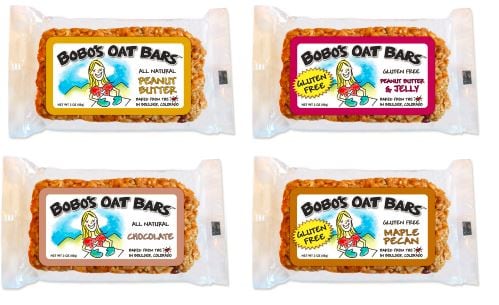Bobo’s founder Beryl Stafford and her oldest daughter (nicknamed Bobo) came up with the formula for the oat bars in their home kitchen. Stafford began selling them to local co-operatives and coffee shops before they were picked up regionally by Whole Foods Market.
Like the bars themselves, growth for the manufacturer has been organic.
“We have been national for five years now and profitable for nearly that long,” Stafford told FoodNavigator-USA. “We do sell mostly in the natural foods channel as opposed to the more conventional channels. We haven’t quite saturated the natural market yet, and I think we’ve done a great job in maxing out our presence there. But this year we are really making a push into the conventional channel, particularly supermarkets.”
Since the bars are naturally gluten free, progression into a certified GF line was natural
Offered in 16 flavors, the bars are formulated with organic rolled oats and brown rice syrup—so they’re naturally gluten-free. But Stafford didn’t market them that way initially, as the gluten-free market was still in its infancy.
“Ten years ago, gluten-free wasn’t a big deal for the general public. I had heard of it and I knew about it, but I didn’t think there was much of a market for it,” Stafford said. “We initially marketed the bars as wheat-free because there were a lot of people avoiding wheat at that time. Since the bars are naturally gluten-free, it was a very natural progression into that market as it continued to grow.”
Given the fairly common risk of cross contamination with gluten in growing and processing oats, Bobo’s gluten-free line is made with certified gluten-free oats and processed on a dedicated production line. The line comprises six flavors, two of which are among Bobo’s top sellers overall.

“Our top sellers are coconut, original and peanut butter—which are wheat free; then maple pecan and lemon poppy—which are both gluten-free—round out the top five,” Stafford said.
Because of the popularity of the gluten-free offerings, consumers often ask why Bobo’s doesn’t transition to totally gluten-free production.
“There are a couple reasons for that,” Stafford said. “For one, gluten-free oats are twice as expensive as regular, so the cost would be significant. People complain that our gluten-free bars are too expensive, which I understand because it’s a notable markup. Our customers with celiac disease are more willing to pay more because they’re used to it.”
Not only that, but many consumers in the conventional market aren’t as educated on gluten-free, she added.
“We were afraid customers shopping the supermarket who don’t have celiac disease might think it won’t taste good, given gluten-free products’ past reputation. So we decided to keep it where people have a choice. If they don’t want to spend extra, they’re getting virtually the same bar. One has the gluten-free certification and the other doesn’t.”
‘Bowl of oatmeal to go’ satisfies consumers’ increasing need for speed
As Bobo’s gears up for mass channel distribution, the firm is rolling out different packaging options to attract a wider audience. In addition to the existing individually wrapped bars, the firm is rolling out packs of two or three and boxes of six smaller bars, which Stafford says are better suited to a supermarket shelf.
Still, the cereal bar set is crowded—with high-profile competitors like Kashi, Nature Valley and Udi’s all vying for shelf space. But intense competition isn’t all bad, Stafford noted.
“The options of cereal bars out there have grown a lot, so there’s always more competition for us as a manufacturer,” she said. “That also means there is a bigger market, bigger desire, and more demand from consumers. Each year as I have done this, I’ve noticed demand for grab and go and quick, easy meals has grown. We position ourselves as a bowl of oatmeal to go, so that need for speed has really helped us.”
Moreover, despite that independent, natural food stores often give small natural products manufacturers more of a chance than conventional grocery, Stafford said she sees growing consumer demand across channels for “smaller batch, hand-baked items—artisan baked products with more of a home grown look, feel and taste. There’s been more of a push for that in the last few years, and that’s helped us a lot.”
Stafford is toying with the idea of expanding into new grab-and-go product lines, incorporating other grains or different ingredients. But for now, the firm remains focused on saturating the market with existing product.
“Honestly there are times during the year where we have a hard time keeping up with demand and orders,” she said. “We’ve decided to saturate market with products we’re producing now and flavors rather than get our focus on things that aren’t necessarily working yet.”
THE FOODNAVIGATOR-USA FORUM: GLUTEN-FREE IN PERSPECTIVE
11.30am EST, April 30, 2014
Find out more about gluten-free market trends and growth opportunities; the science behind celiac disease, gluten intolerance and wheat allergy; the technical challenges of formulating great-tasting gluten-free products; and the latest consumer research.
This LIVE online panel debate moderated by FoodNavigator-USDA editor Elaine Watson brings together world-renowned celiac disease researcher Dr Alessio Fasano; TJ Mcintyre from leading gluten-free manufacturer Boulder Brands (Udis, Glutino); Dr David Sheluga, director of commercial insights at food and ingredients giant ConAgra Foods; and Tom Vierhile, innovation insights director at Datamonitor.
